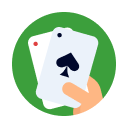Phoenix Wright
Legend
Loyaler
I am fairly new to poker, but I have always loved psychology. Naturally, I excel at that aspect of poker and spotting/concealing tells is second nature for me: however, sometimes I still run across some questions regarding the theoretical and fundamentals of what play is "standard."
From a little practice, I've learned that I am decent at full ring poker (at least decent for a beginner). However, I am not nearly as good as I'd like when it comes to heads-up and this is clearly an area where a psychology-heavy player should thrive.
In a recent heads-up game (NL Holdem, deep stacked), I was dealt 4, 2 offsuit preflop from the small blind. I put my opponent on a strong range of pocket 9+, or hands like Ace-King, Ace-Queen etc. I instant folded my junk hand and my disgusted opponent revealed pocket Queens face-up.
Post-game, this got me thinking: If I identified their hand accurately, then how long should I continue the hand if I am behind? If I had a slightly better hand (since 90% plus heads up range is understandable), then perhaps I'd see a flop - but at what hand is continuing even to the flop worth it in heads-up if you believe you are behind? I didn't feel like wasting chips when I was behind, so I just folded.
Here was my thinking: pocket Queens against my hand was about 85% favorite preflop, so naturally, continuing to showdown is only better for me roughly 15% of the time (sounds like an instant fold). However, the hands where you can extract the most value from the opponent are hands where you pretty much know what they have and you are slightly better. With this in mind, the few times the hand catches up might be big pots if you've pin pointed your opponent's range/hand well. I wouldn't want to continue with 4, 2 offsuit, but what about mediocre or competitive hands behind pocket Queens? At what point is continuing here a respected play assuming the range I gave in this specific case?
From a little practice, I've learned that I am decent at full ring poker (at least decent for a beginner). However, I am not nearly as good as I'd like when it comes to heads-up and this is clearly an area where a psychology-heavy player should thrive.
In a recent heads-up game (NL Holdem, deep stacked), I was dealt 4, 2 offsuit preflop from the small blind. I put my opponent on a strong range of pocket 9+, or hands like Ace-King, Ace-Queen etc. I instant folded my junk hand and my disgusted opponent revealed pocket Queens face-up.
Post-game, this got me thinking: If I identified their hand accurately, then how long should I continue the hand if I am behind? If I had a slightly better hand (since 90% plus heads up range is understandable), then perhaps I'd see a flop - but at what hand is continuing even to the flop worth it in heads-up if you believe you are behind? I didn't feel like wasting chips when I was behind, so I just folded.
Here was my thinking: pocket Queens against my hand was about 85% favorite preflop, so naturally, continuing to showdown is only better for me roughly 15% of the time (sounds like an instant fold). However, the hands where you can extract the most value from the opponent are hands where you pretty much know what they have and you are slightly better. With this in mind, the few times the hand catches up might be big pots if you've pin pointed your opponent's range/hand well. I wouldn't want to continue with 4, 2 offsuit, but what about mediocre or competitive hands behind pocket Queens? At what point is continuing here a respected play assuming the range I gave in this specific case?




